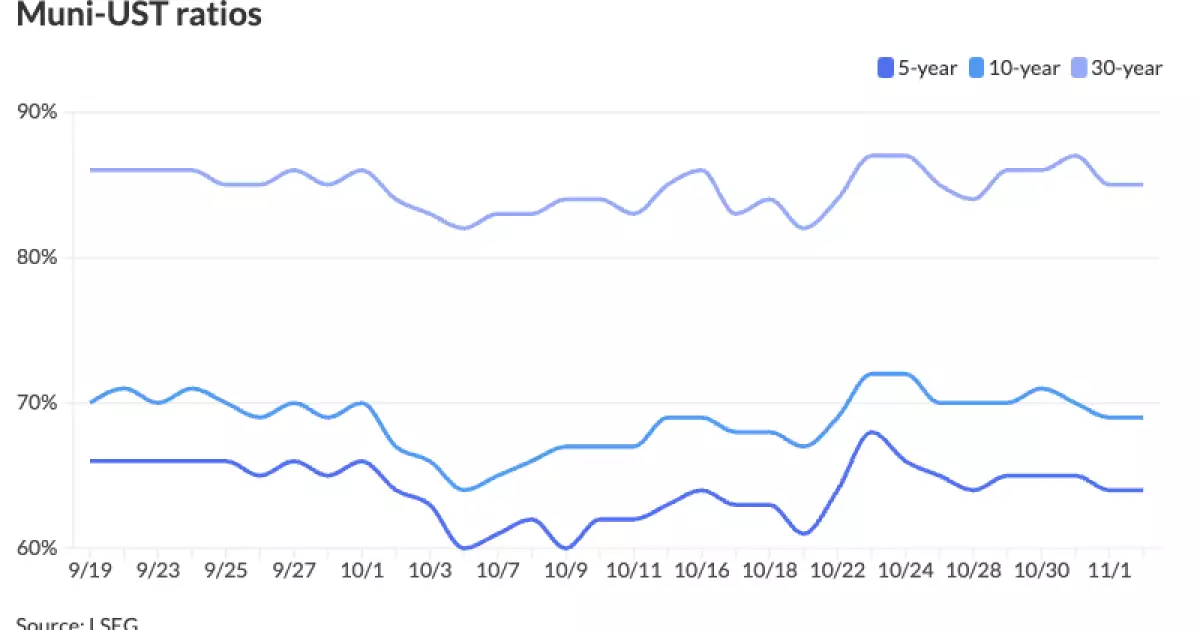The municipal bond market finds itself navigating through a tumultuous environment defined by political anxiety and economic uncertainty. Investors are cautiously navigating ahead of a significant election and an impending Federal Open Market Committee (FOMC) meeting, each of which could substantially affect market dynamics. The recent drop in U.S. Treasury yields and mixed performance in equities underscore a landscape rife with volatility that stakeholders must confront.
As the political climate intensifies, market participants are bracing for potential turmoil that may arise from contrasting political outcomes. Analysts assert that the ramifications of the upcoming elections could lead to drastic shifts in economic expectations. Daryl Clements, a municipal portfolio manager at AllianceBernstein, characterized the current situation as a final countdown as investors await election outcomes that could drastically alter both political and economic landscapes.
The anticipation of a “red wave,” could potentially cause yields and inflation expectations to surge, while a “blue wave” may lead to smaller increases in yields due to implications for taxation and spending initiatives. In light of these dynamics, a divided government might yield the most conducive scenario for stability, with the limited legislative maneuverability likely leading to lower expectations for both yields and inflation.
Adding another layer of complexity to the municipal market’s outlook is the forthcoming FOMC meeting, where the Federal Reserve’s course of action concerning interest rates will be unveiled. The Federal Reserve’s September rate cut offers a backdrop against which market participants can speculate the likelihood of future cuts or a pause. According to Tom Kozlik from HilltopSecurities, the recent economic data suggests a cautious approach may be warranted, as indicators of economic growth emerged weaker than anticipated.
For instance, the GDP growth estimates fell slightly short of expectations, while job creation numbers came in substantially below forecasts. This data emphasizes the Fed’s dependence on ongoing economic indicators in guiding its future monetary policies. It underscores the sense of urgency and the need for investors to remain adaptive to fluid market conditions instigated by both political and economic shifts.
In recent days, the municipal bond sector has demonstrated signs of resilience, reflecting more balanced trading conditions as investors began to engage with the market amidst favorable yield levels. Birch Creek strategists noted that a surge in two-way flows indicates robust levels of market activity as sellers adjust to the realities of a volatile market just ahead of crucial dates on the calendar.
Investors have been gravitating toward purchasing opportunities as yielding levels rise, resulting in a notable increase in demand for high-quality municipal bonds. Clements captured this sentiment, highlighting that municipal bond mutual funds saw inflows, marking an impressive stretch of 18 consecutive weeks of positive fund flows, a testament to growing investor confidence amid uncertainty.
Despite a predicted lull in the primary issuance market this week due to the upcoming election, noteworthy deals continue to emerge, as exemplified by the issuance from the Texas Municipal Gas Acquisition and Supply Corp. The shift towards a quieter market is indicative of the cautious stance taken by many market participants who are hedging against potential fluctuations.
Analysts suggest that as we navigate through November and December, the dynamics of supply and demand could favor the municipal market significantly. The anticipated drop in new bond issuances relative to robust investor demand may pave the way for a favorable technical picture as the market adjusts to the evolving landscape.
As illustrated by Clements, while uncertainty may prevail through the election period, the expectation is that yields may trend lower over the coming months, encouraging investors to capitalize on current opportunities. In this context, the trajectory for municipal bonds appears promising.
In wrapping up the analysis of the municipal bond market’s current state, it becomes clear that a cocktail of political maneuverings, economic indicators, and market behaviors intertwine to create a complex backdrop for investors. With the election and the FOMC meeting looming large, stakeholders are urged to remain vigilant, adapting their strategies to leverage potential opportunities and mitigate risks inherent in an evolving economic landscape.
In essence, while volatility is expected, the willingness of investors to engage with the municipal market amid these challenges hints at an optimistic future. Therefore, a proactive approach will best position market participants to navigate through this uncertain terrain and ultimately thrive in the expected shifts that lie ahead.

